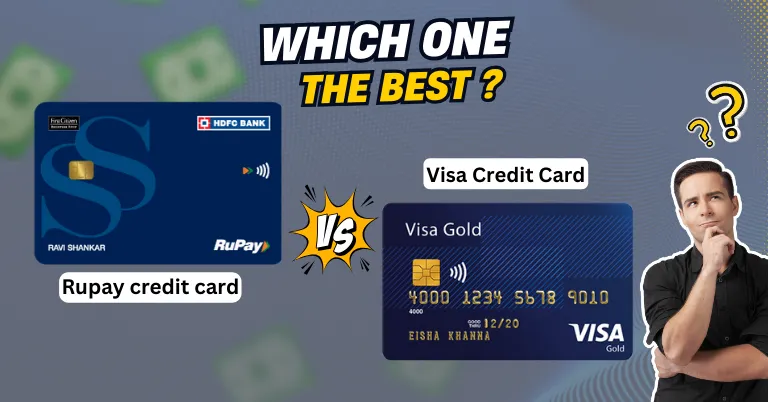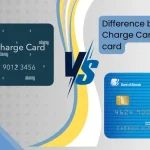Credit cards have become a device for modern financial transactions, offering the convenience of being secure and rewarding. Among various card options, RuPay and Visa are the two most popular ones chosen in India. Though these two cards serve the very purpose of making payments, both are quite different in origin, acceptance, features and even suitability for different types of users. There are many more cards available and there are many banks that provide the best cards for example HDFC Bank credit card, Axis Bank credit card, etc. But this article will help you with all the details to choose the right card among RuPay Credit Card vs Visa Credit Card for your financial needs.
1. Origin and Ownership
Visa Credit Card
- Visa is a financial services company whose headquarters is in the United States.
- It was established in 1958 and has since developed to be one of the world’s largest payment networks.
- The company operates in more than 200 countries, hence making it one of the leading players in the global financial marketplace.
RuPay Credit Card
- RuPay is India’s domestic card scheme, which was launched by the National Payments Corporation of India (NPCI) in 2012.
- It was designed to promote a self-reliant payment system aligned with the Reserve Bank of India’s (RBI) vision.
- RuPay caters primarily to the needs of Indian consumers and merchants.
2. Acceptance and Reach
Visa Credit Card
- Visa credit cards are accepted by over a million merchants and ATMs across the globe.
- Ideal for international travel and online shopping with retailers based globally.
- It offers unmatched ease for transactions across the other country.
RuPay Credit Card
- RuPay credit cards are very widely accepted in the country. Any merchant, ATM, or online can use it. It has low acceptance outside of the country, but NPCI has been on the ground to reach as many countries as possible by partnering with Discover, JCB, and UnionPay.
- Major Difference: Visa accepts globally whereas RuPay is well suited for cross transactions within the Indian market.
3. Transaction Fees
Visa Credit Card
- International transactions tend to charge more processing fees.
- Merchants incur these fees but sometimes recover them from the buyer.
RuPay Credit Card
- RuPay’s focused approach on the domestic end makes it cheaper.
- Even for Indians, RuPay is a cost-effective credit card, especially for domestic transactions.
4. Security Features
Visa Credit Card
- Provides robust security measures, like Visa Secure previously known as Verified by Visa-, to ensure safe transactions.
- Advanced fraud detection systems and 24/7 customer support all around the world increase security.
RuPay Credit Card
- It has strong security features that include RuPay PaySecure with two-factor authentication
- The security is customized for the Indian market ensuring safe transactions.
5. Benefits and Rewards
Visa Credit Card
- Comes with a wide range of global benefits, including:
- Travel insurance
- Purchase protection
- Exclusive offers at international hotels, restaurants, and retailers
- Loyalty programs with reward points, cashback, and discounts
- Ideal for frequent travelers and global shoppers.
RuPay Credit Card
- Focuses on benefits tailored to Indian consumers:
- Indian customer-oriented benefits:
- Accidental insurance coverage, particularly on Platinum and Select variants
- Discounts and cashback by partnering with Indian merchants and service providers
- Features that are affordable for daily domestic purposes.
6. Technology and Innovation
Visa Credit Card
- Visa is always investing in state-of-the-art technologies like contactless payments, biometric authentication, and mobile wallet integration.
- Acceptance at worldwide digital payment services, including Apple Pay, Google Pay, and Samsung Pay.
RuPay Credit Card
- It focuses on innovation suited to India, such as Aadhaar-based authentication and UPI integration.
- Accepts Bharat QR for smooth digital payment.
7. Government Initiatives and Support
RuPay Credit Card
- The RuPay Credit Card is given government support by the government of India and is an important part of initiatives like the Digital India movement.
- Provides credit cards under schemes like the Pradhan Mantri Jan Dhan Yojana (PMJDY) that ensures financial inclusion.
Visa Credit Card
- Since Visa is an International company, it doesn’t rely too much on the government initiatives in India.
Conclusion: Which Card Should You Choose?
Selecting either a RuPay or a Visa credit card depends solely on the specific needs and usages:
- Choose Visa Credit Card If:
- You do frequent international travel or also make online transactions abroad.
- You want global acceptance, luxury rewards, and leading-edge technology.
- Choose RuPay Credit Card If:
- You primarily make transactions in India
- You want a cost-effective card with locality benefits, especially designed for Indian consumers
- You would want to promote the shift to domestic payment systems in India.
Visa and RuPay both have their positives and you can see why for making the right choice among these credit cards. Analyze your spending behavior, frequency of travel, and all that other stuff to choose a card that is suitable for your lifestyle.
FAQs on RuPay Credit Card vs Visa Credit Card
Q1. Which card is better for international transactions?
Ans. Yes, RuPay is accepted everywhere in India- all the ATMs, merchants, and e-commerce.
Q2. Are RuPay credit cards widely accepted in India?
Ans. Yes, in most cases, the insurance covers offered by RuPay for its Platinum and Select variant users cover accidental insurance along with many more benefits.
Q3. Do RuPay credit cards offer insurance benefits?
Ans. Yes, RuPay credit cards, especially Platinum and Select variants, offer accidental insurance coverage and other benefits.
Q4. Which card has lower transaction fees?
Ans. RuPay credit cards have relatively lower transaction fees, which makes them more economical for domestic use.
Q5. Can I use a RuPay credit card internationally?
Ans. RuPay credit cards have limited international acceptance, though partnerships with global networks like Discover and JCB are expanding their reach.






